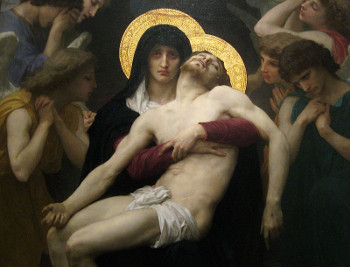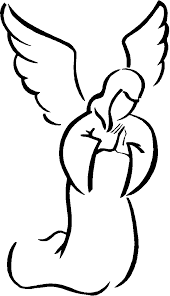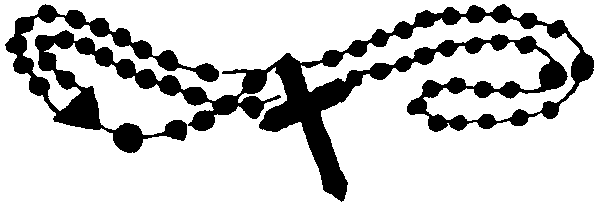
A NOVENA of Masses
in honor of
Our Risen Savior & His Divine Mercy
April 1 - April 9
TO BE OFFERED FOR YOUR INTENTIONS
Fr. Joseph Sergott, O.P.
Human suffering may be the greatest obstacle between ourselves and God because we do not understand it. Lacking knowledge, wisdom or faith, we often make uneducated guesses, or to put it more bluntly, ignorant judgments regarding the motives and ways of the Lord.

People often ask, "Why does the loving God allow us to suffer-or worse-seemingly inflict suffering upon us?" The base of our theological foundation is the fact that God is love (1 John 4:16); therefore, all of his objectives, his plans, and his interaction in our lives are always rooted in the principle of divine love. Moreover, if Jesus Christ died for us on the cross-knowing all of our sins-the grace from his death and resurrection continues to flow even now toward our salvation and not toward our condemnation (Cf. John 3:17).
Much hidden wisdom can be found in the scripture passage of the vine and the branches (John 15:1-17). Packed within it are the reasons why the Lord allows our suffering and what he wants us to gain from it. If your life bears no fruit or only some good fruit, God will intervene and break off the dead branches or the good little sprigs that will not bear enough fruit-and it will cause pain. You can even be bearing much fruit; however, when the Lord sees the potential to bear more, he will intervene so that you can bear abundant fruit-and it will cause pain. The Master Vinegrower is about saving our souls and us bearing fruit for the kingdom. Thus, he disciplines those he loves for their own good-and it hurts! So, just what kind of fruit is worth all of this pruning? The fruits of joy, peace, unity, patience, kindness, goodness, faith and love (among others) are what God intends for us.
However, sometimes our pain and suffering are selfinflicted; yet, we don't see it. It's easier to blame the Lord or other people. If we are bearing rotten fruit, due to sin or addiction, we will not be at peace or find happiness; we will suffer immensely. So, those caught up in deep sin or addiction will bear rotten fruit that affects their lives and everyone around them. Sin and addiction beget the "fruits" of misery, discord, isolation and despair. So, the Master Vinegrower takes all that, using a four-letter word-DUNG-and he uses it. He takes the bad fruit, which is worthless, dead spiritual dung and is only good for fertilizer, and he lays it at our feet, that through his grace-filled love we may rise from spiritual death.
Sometimes though the greatest fruit is born from deep suffering that is not about our sinfulness. In this case the Lord wants us to share more intimately in his Son's passion and death. In great frustration, many of us cry out, "Why?!" St. Paul says, "The message of the cross is complete absurdity to those who are headed for ruin, but to us who are experiencing salvation, it is the power of God." (1 Cor 1:18) Thus, when we undergo this kind of suffering, the Lord is not afflicting us with suffering for its own sake; rather, through it he wills that we enter deeper into his divine love. Thus, we experience salvation by being purified and sanctified through the fire and power of God's love. Thus, even the Blessed Virgin Mary, who never sinned, heard the words, "and you yourself a sword will pierce," (Luke 2:35) signifying that she herself would participate in her Son's sufferings (and glory) on the cross. In fact, it seems to me that the Blessed Virgin would have desired to be united with her Son in all things, even in his sufferings.
At other times our suffering reflects that of Jesus because he wants us to suffer for those who are in a very difficult situation (even though his suffering alone has redeemed the world), perhaps loved ones, perhaps those whose souls are in peril. So, the Lord gives us suffering to bear that impacts their lives. In this case, we become Christ-like figures.
Regarding suffering, St. Louis de Montfort says, "The glory of one who knows how to suffer is so great that heaven, angels and men, and even God himself, gaze on him with joy as a most glorious sight." (St. Louis de Montfort, Letter to the Friends of the Cross, #38)
In addition, we wonder why some people have to die, especially when it is too soon from our perspective. We question, "What sort of punishment is this?" But, if our loving Lord wants to take someone home to live in heaven in peace and joy, and enjoy the fruits of his glory for all of eternity, what sort of suffering is that? From this world's viewpoint, it's painful to say good-bye; but those in heaven understand it perfectly and are waiting for that soul's arrival.
Finally, St. Paul says that we are afflicted in every way... continually carrying about in our bodies the dying of Jesus, so that the life of Jesus may also be manifested in our bodies (Cf. 2 Cor 4:8-10). In dying on the cross, Jesus was glorified while also giving glory to his Father. It is the great paradox of salvation history: with his suffering and death, Jesus sanctified human suffering and death and opened the door to eternal life. Thus, now we can unite our own personal sufferings, our own cross, to that of Christ, and when we do so we glorify God and share in Christ's glory. Moreover, when we unite our own suffering with Jesus, it can be a sign of our own future resurrection and glorification in heaven.(Cf. 1 Peter 4:13; Romans 8:17) Yes, that's right, our suffering and death, accompanied by faith in Jesus Christ, will lead to our resurrection and glorification in heaven. Remember, you cannot experience resurrection until you have died-that means in all the little ways throughout life, but also when your life reaches its zenith.
So, you who are afflicted with physical suffering, you who suffer spiritual torment, you who are aggrieved by mental illness, you who have been confined to bed for years, you who are imprisoned, you who suffer from the weight of your own sins or addiction-you who are dying-unite yourself with the Lord Jesus through faith, and I promise you, he will give you a share in his glory.
A NOVENA of Masses
in honor of
Our Risen Savior & His Divine Mercy
April 1 - April 9
TO BE OFFERED FOR YOUR INTENTIONS

by Fr. Peter Hannah, O.P.
Consider for a moment the broad array of characters in the early church: Peter; Paul; James; Stephen; Silas; Priscilla; Aquila; John Mark; Lydia; Cornelius; Timothy... Men and women of all ages and ranks. Now consider that the human being closest to Our Lord in his earthly life, she who was the human vessel chosen by God to bring him into the world, appears only once in the entire tale of the early church. Where is she? She appears in the "first chapter" of the Church at its foundation: "All these with one accord devoted themselves to prayer, together with the women and Mary the mother of Jesus, and with his brothers" (Acts 1.14). This seems to me important. Presumably Mary went on living for some time. But she is not visible as others are. What was she doing? Can there be any doubt that she continued to do what she is pictured doing at the beginning? Our Lady witnesses to the power of prayer in silence; a power which, one intuitively grasps, became a kind of anchor of support for the early church. One is reminded today of the legions of contemplatives who, following the example of Our Lady, sustain the Church by their lives of prayer also.
In considering what Our Lady would say about chastity, she perhaps would say many things. But I wonder if the first thing would be that chastity is a virtue which takes root and grows and blossoms in the power and presence of God. Our Lady is honored as "most chaste" in many prayers, and to be sure of all human beings she was. But I believe she would be the first to say that her chastity, her purity of heart and mind, came from Another. In today's noisy world, filled with so many clamorous and disturbing voices, Our Lady might simply counsel those who seek chastity to, above all things, dwell with God. Through a life of prayer-lived in whatever state of life-the good seeds planted by God in us by baptism, are given room to grow and flourish. The Lord can prune them too-this is what confession is for. But above all to make a person chaste, the Lord needs a humble and docile heart, as Our Lady's, offered to Him in faith and prayer .
Blessings & Petitions Corner
Dear faithful supporters of the Rosary Center & Confraternity,
At the Rosary Center we are grateful for your support. There
are three kinds of benefactors: those who support us financially,
those who pray for us and those who volunteer for us. We could
not do this ministry if not for our benefactors. Please join us in
asking God to bless all of our benefactors abundantly, and the
Blessed Mother to watch over them and their families and to
intercede for them.
Thank-you,
Fr. Joseph OP, Rosary Center Director
AN APPEAL TO OUR POSTAL ANGELS
 The Rosary Center sent approximately
17,000 rosaries to our missionary friends in
2017 and most of these went to overseas
addresses. Postage is currently $70.00
for each box we send to our missionaries.
We depend upon you, our friends and
benefactors for everything we do, and distributing rosaries
to those longing to hear our Blessed Mother’s Good
News is an essential part of our ministry. We beg you to
join us in this apostolate by making a special gift to our
Postal Angels program. You will never know whom your
kindness touches, but those who receive our rosaries will
never forget you.
The Rosary Center sent approximately
17,000 rosaries to our missionary friends in
2017 and most of these went to overseas
addresses. Postage is currently $70.00
for each box we send to our missionaries.
We depend upon you, our friends and
benefactors for everything we do, and distributing rosaries
to those longing to hear our Blessed Mother’s Good
News is an essential part of our ministry. We beg you to
join us in this apostolate by making a special gift to our
Postal Angels program. You will never know whom your
kindness touches, but those who receive our rosaries will
never forget you.
